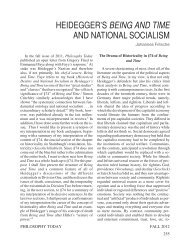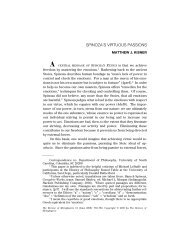Perverted Conversions: - Philosophy Documentation Center
Perverted Conversions: - Philosophy Documentation Center
Perverted Conversions: - Philosophy Documentation Center
You also want an ePaper? Increase the reach of your titles
YUMPU automatically turns print PDFs into web optimized ePapers that Google loves.
— 142 —<br />
Rachel Walsh<br />
• • •<br />
to curse Islam and because they started to hit my broken leg, I cursed my religion.<br />
They ordered me to thank Jesus that I’m alive. And I did what they ordered me.” 22<br />
Al-Sheikh is forced to mimic the words of the petty sovereign that mark him as a<br />
cultural and religious Other whose values are incompatible with the secular humanism<br />
espoused by America. In a grotesque mirroring of a religious confession in which<br />
one’s sins become one’s identity (“Bless me, Father, for I have sinned” is read as “I<br />
am a sinner, I submit myself to you”) and one’s sins can only be absolved when one<br />
assumes that identity, he is forced to answer, in the language of the petty sovereign,<br />
the interpellation of his constructed difference that is both his sin and his prescribed<br />
identity. Here, however, there is no absolution; the uncivilized, Islamic Other must<br />
be continually addressed as uncivilized in order to legitimate the sovereign’s exercise<br />
of power.<br />
Astoundingly, as Al-Sheikh is addressed as the uncivilized and religious Other<br />
who cannot be converted to a secular humanism, the sovereign is aligned with and<br />
represents that secular humanism at the very moment when the universal humanism<br />
(“thank Jesus that I’m alive”) so clearly reveals that it can only accommodate a Judeo-<br />
Christian, Western body. Here, too, the confession and the conversion that are cited<br />
in the cursing of Al-Sheikh’s religion are not staged for the transformation of the<br />
soul, but rather for the denial of the soul. Culminating in what Foucault identifies as<br />
the medieval spectacle of sovereign power and the modern creation of docile bodies,<br />
torture creates the human and inhuman bodies by positing the Islamic body as that<br />
which is soulless and therefore incapable of being converted.<br />
In Discipline and Punish, Foucault notes that prior to the nineteenth century<br />
punishment assumed the form of public spectacles in which the body of the condemned<br />
was marked as “the place where the vengeance of the sovereign was applied, the<br />
anchoring point for a manifestation of power, an opportunity of affirming the<br />
dissymmetry of forces.” 23 In contrast, the modern age concealed crime and punishment<br />
from the public’s view and established a scopic monopoly of power; the public<br />
instead became the object of the state’s gaze. Rather than demonstrating the power<br />
of the sovereign through the spectacle of torture, the penal system sought to discipline<br />
the soul of the criminal.<br />
Although Foucault’s analysis of Western forms of punishment concerns the<br />
state’s treatment of its citizens, it is useful to consider the acts of torture at Abu<br />
Ghraib within this framework. Overlaid with the religious connotations of modern<br />
forms of punishment and the symbolism and spectacle of medieval methods of<br />
punishment, these acts of torture are both private and public. The digital photographs,<br />
22. Danner, Torture and Truth, p. 227.<br />
23. Michel Foucault, Discipline and Punish: The Birth of the Prison, trans. Alan Sheridan<br />
(New York: Vintage Books, 1977), p. 55.

















